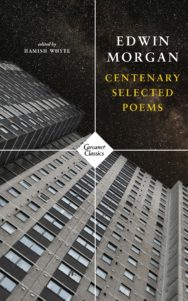‘Familiarity has bred only increased admiration and love for one of the most incredibly various and fascinating bodies of work I know in modern literature.’
Back in April BooksfromScotland celebrated Edwin Morgan’s centenary with a dedicated issue. But the celebrations continue, and Carcanet Press have just released a brand new selection of his poems, chosen by Hamish Whyte. Here, he tells us how he approached curating the collection, and how his appreciation of Edwin Morgan’s work only grows.
Edwin Morgan: Centenary Selected Poems
Edited by Hamish Whyte
Published by Carcanet Press
‘Why didn’t you write an introduction?’ someone asked me. That, as politicians say without answering, is a good question. My immediate answer was that I wanted the work to speak for itself, without any mediation. Readers who know the poems will need no introduction and readers who don’t will find a wonderful world of words and wonders to navigate and discover. Eddie [I’m more comfortable with ‘Eddie’ than ‘Morgan’, if that may be permitted] himself never liked notes in his books and had to be persuaded, for example, that an index could be a useful aid in Sonnets from Scotland. He did relent slightly in later life. He wore his own learning lightly and always reckoned that readers, if they didn’t know a word or place or reference, could look it up (as he had!). There’s plenty of criticism of Eddie’s work – and reviews – published already to provide background – not least The International Companion to Edwin Morgan (ASLS, 2015).
But what, my interlocutor persisted, guided my choice of poems, what to include and what to leave out? I have long thought that the act of selection (whether for an anthology or a poet’s Selected) is an act of criticism in itself – the reader could work out for themselves the editor’s prejudices and thought processes from what’s there and what’s not. It’s always a mixture of the subjective and objective: the editor’s favourites and what the editor has concluded has stood or will stand the test of time. A bit of favouritism gives a book an extra flavour and will hopefully provoke argument and discussion.
But I’ll try to answer how I went about the selection and articulate what principles (if any) were behind it. I took as template Eddie’s own choice from his work for the New Selected Poems published by Carcanet in 2000 – this in turn was based on the earlier Carcanet Selected Poemsof 1985. I had contributed in a small way to both these volumes by suggesting inclusions to Eddie – some he went with, some he didn’t. In both earlier Selected’s at least half of each volume was devoted to poems from three collections, The Second Life, From Glasgow to Saturn and The New Divan, the last published in 1977. Presumably, these are the poems Eddie wanted his reputation to stand on. Of course, there were many more great poems to come, not least the poems written in the light of his diagnosis of terminal cancer (‘A Gull’ etc.); his Demon sequence and the late confessional Love and a Life (written in his own invented stanza form).
Eddie is on record as saying that if a half dozen or so of his poems were to last, he’d be content. But he didn’t say what these might be! It’s interesting to speculate. ‘Cinquevalli’, certainly, which he admitted was his own favourite. Perhaps: ‘Strawberries’, ‘In Sobieski’s Shield’, ‘The First Men on Mercury’, ‘The Loch Ness Monster’s Song’, ‘A Gull’, ‘Trio’ – to choose off the top of my head. They exemplify Eddie’s best characteristics and qualities: imagination, passion and compassion, verbal virtuosity and ventriloquism, optimistic faith in humankind. Others will choose others. But they are mostly from his two standout collections, TSL and FGTS, from the 60s and 70s. That was the basis for the new selection. Eddie was extraordinarily prolific in the last two decades of his life (after his Collected Poems had come out), so that had to be represented as well – but how much? This is where personal preferences creep in. In the 1990s he became almost obsessed with writing poems of three line rhyming stanzas – I find these increasingly wearisome and occasionally doggerelish. I have included one (here declaring an interest, as it’s dedicated to myself and Henry Heaney, former head of Glasgow University Library, but excused as it’s about the shedding of Eddie’s books and papers to institutions). I think an editor should be allowed some perks of this sort. While on this, I have to say I have included a poem whose subject I had suggested to Eddie, ‘Nineteen Kinds of Barley’ (I had sent the list to him from a holiday on Arran) but which in my defence I consider a good poem. Other personal favourites I have excluded: ‘A Defence’ [on magpies], ‘Pomander’ and ‘Let Glasgow Flourish’. One can’t, as they say, include everything.
A poem that Eddie consistently left out of his Selected’s was ‘Linoleum Chocolate’, from The Second Life. It is a slight poem but I have put it in to illustrate Eddie’s discovery in the 1960s that he could write about anything, even a brief scene seen from a bus. He very usefully dated his poems in that collection and this poem seems to have been the first of his series of deservedly famous Glasgow poems: ‘Glasgow Green’, ‘In the Snack-bar’, ‘King Billy’ and the rest.
I have included nothing from Tales from Limerick Zoo, a pamphlet of slight, mildly amusing animal limericks – written in 1988 at a time of family difficulty for Eddie to keep his mind occupied. He didn’t include them in his 1990 Collected or the 2000 New Selected, and I’ve respected that. The publication is probably a collector’s item now.
I have also taken nothing from Sweeping Out The Dark of 1994, except some poems reprinted there from the 1991 sequence Hold Hands Among the Atoms, which I have reinstated as a separate sequence with the addition of others from that publication – I feel they work better in the context of a series rather than as random poems.
In the 1985 Selected Eddie included a poem rescued from 1956, ‘Night Pillion’ (which prefigured his later Glasgow poems). I have left it as a poem taken from that Selected rather than put it back in its correct chronological position between The Vision of Cathkin Braes and The Second Life simply to illustrate Eddie’s rethink of the poem’s worth.
A lot of experimental work I have excluded – interesting yes, but experimental (and he never stopped experimenting, from the 1950s on) – but it can wait for a new Collected. There is enough in the Centenary Selected I hope to indicate this area of Eddie’s work.
Reasons of space are always given for exclusions and that is the case here. I would have liked to include something (if not everything) from the sequence Planet Wave, Eddie’s short history of the world, but Sonnets from Scotland will have to serve as an exemplar of this kind of sweep of the byways of history (pre- and future) as seen through the eyes of interplanetary explorers. Planet Wave was a collaboration with the jazz musician and composer Tommy Smith. The complete sequence can be found in A Book of Lives (2007). Beasts of Scotland was another joint work – excerpts from which are included in the Centenary Selected.
In conclusion, I hope that the whole range of Eddie’s work, from love poems to science fiction and beyond, is represented in this Centenary Selected. I’ve lived with Eddie’s poems most of my adult life. Familiarity has bred only increased admiration and love for one of the most incredibly various and fascinating bodies of work I know in modern literature. And, to answer the question, why no introduction? Well, this can be it.
Edwin Morgan: Centenary Selected Poems edited by Hamish Whyte is published by Carcanet Press, priced £14.99.
You can catch more Edwin Morgan Centenary Celebrations at this year’s online Edinburgh International Book Festival. Book your free spot here.
ALSO IN THIS ISSUE

 The Book According to…Doug Johnstone
The Book According to…Doug Johnstone
‘It’s dark, existential stuff, but funny too, hopefully. It starts with a car crashing into an open …














